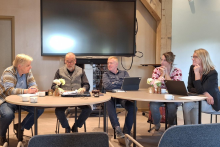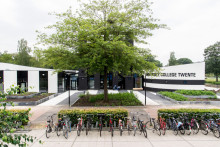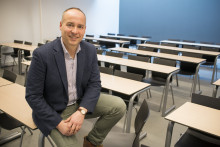Katharine Owens studies implementation of policy at CSTM (Centre for Clean Technology and Environmental Policy). The American Phd student came to the UT a little over a year and a half ago for a four year research contract working on wetland policy implementation.
Owens comes from a diverse academic background with degrees in Studio Art, Biology, Anthropology and a masters in Environmental Science all from the College of Charleston in South Carolina. The area around Charleston contains a great deal of wetlands and is also known as the `Low country'; though the climate is markedly different from the Netherlands there are a few geological similarities. The core of her research is comparing policy implementation in Dutch and American wetland areas. Speaking of her work at CSTM Owens says, `After a lot of groundwork, my research is now mostly conducting interviews with people involved in the decision making process.' In the Netherlands people tend to come together as a large group and work towards an eventual solution that attempts to involve many viewpoints; this has cultural roots in the polder model of cooperation and negotiated agreements.' Owens contrasts this with the more litigious environment in the U.S.: `In the U.S. decision making about wetlands is very contentious; the perception is that real decisions are decided in court cases. A big difference is that in the U.S. the issue is the development of land that is normally untouched and arguably critical habitat; here it is not the development of pristine natural areas but management of already manipulated land.'
Working in an international setting has a lot of advantages that Owens looked forward to when coming to the Netherlands. `Other international students have asked why I would choose to come here when many graduate students are looking for programs in the U.S.; for me it was an opportunity to get some real cultural experience abroad beyond just travel and also to work on a project that meshed well with my previous research program. Compared to the States, we have a nice small department with a great deal of advisor interaction; there is less of a teaching burden on Phd students here. My work is almost exclusively research and study which is ideal.' Exposure to international networks is another advantage cited by Owens: `The diversity of students and professors I have met in the last year or so is invaluable; I think an international perspective in environmental policy studies will only become more significant in the future.'
Future plans after her tenure in Twente are uncertain and ultimately depend on job opportunities that develop in the next two years, according to Owens. `I'd enjoy doing similar policy research with a think tank or applying this decision making research somewhere in the non-profit sector.'
Hometown: Valdosta, Georgia USA
Favourite author: John Irving
Favourite film: (classic) Citizen Kane, (modern) The Royal Tenenbaums
Music: Beastie Boys
Favourite food: Shrimp and Grits
Dream destination: India or Madagascar
Most referenced website: Internet Movie Database
Miss most about home: Friends, family, warm weather
Best part of NL: All the little things that make it different from home.
Worst part of NL: Weather

Katharine Owens







